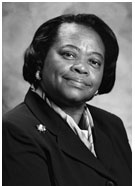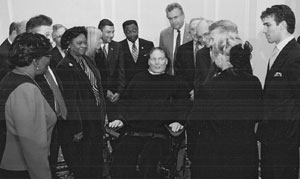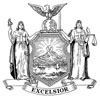
|
News from Assemblywoman Vivian E. Cook |

|
|
||
|
|
|||
| Winter 2003 | |||
|
|||||

|
Assemblymember Cook joins Speaker Sheldon Silver along with Christopher Reeves and Assembly colleagues at a press conference to unveil legislation aimed at fostering biomedical research. The legislation, A.6249, would allow stem cell research to continue while completely prohibiting reproductive cloning. Stem cell research is vital to develop new treatment and prevention methods that may help those stricken with spinal cord injuries, infertility, and Alzheimer’s disease. |
|
||||||
|
|
COOK ANNOUNCES PENSION REFORMS TO PROTECT RETIREES AND LOCAL TAXPAYERS Assemblymember Cook has announced recent state pension reforms she supported to protect retirees by strengthening the retirement system while avoiding huge increases in costs to state and local governments and property taxpayers (Chapter 39 of 2003). Assemblymember Cook noted that the recent volatility in the stock market threatened pension fund investments and placed a huge financial burden on local governments. Under the new law, which State Comptroller Alan Hevesi helped author, pension costs to state and local governments would be reduced, saving localities $1.6 billion. “Retirees should not spend their golden years worrying they will not be able to support themselves nor should local taxpayers be forced to pay sudden, steep tax increases to stabilize the state pension fund,” said Assemblymember Cook. The measure will protect pension benefits by setting minimum employer contributions and making their annual contributions more predictable to avoid sudden increases in pension costs. The measure also allows governments to receive one-time financing of pension costs to alleviate an expensive burden many are facing this year. “These improvements, which would not have been possible without the input of the comptroller, local governments, unions and retirees, will help ensure that nearly one million members of the state retirement system and their families have the peace of mind they need,” said Assemblymember Cook. |
|
||||||||||
|
||||||||||
|
If your checks are stolen or lost, notify the bank immediately and stop payment on all missing checks. You should also contact the major check verification companies:
CHECK VERIFICATION COMPANIES
For information about a particular charity contact:
Health Insurance Questions/Scams
Home Equity Fraud
Work at Home Scams |
|
WHERE TO CONTACT ASSEMBLYMEMBER COOK |
||
|
Albany Office |

|
District Office |
|
Back |